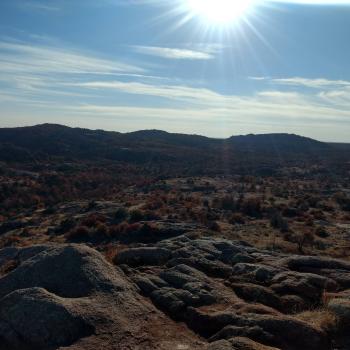
I’ve been teaching Sunday School on the book of Revelation. (Drop by if you’re in the Moundridge area–Sunday mornings at 9:30!). It’s a challenging book that brings to the fore all sorts of prickly theological problems, not least the relationship of mercy and judgement, God’s sovereignty over the world, and suffering for our faith in Jesus. I’m convinced getting Revelation right matters. Here’s why:
1.) When we get Revelation right, we inoculate ourselves against late-night conspiracy-theorist DVD-mongers. You know who I’m talking about. They’re the folks who are always interpreting current events as signs of the impending end of the world. (The shows are really just a tease. For $19.95 plus shipping and handling you can get the DVD that explains the rest in lurid, apocalyptic detail). And while Jesus calls us to be a people who pay attention to the signs of the times (see Luke 21:28-34), he also promises that no one will know the exact timing of the end (Mark 13:32).
2.) When we get Revelation right, we bear witness to the truth of the gospel. End time calendars and predictions usually look a little kooky, and they end up making Christians look kooky too. When people see Christians making claims about hidden planets that will collide with the earth, etc. etc., it discredits the church. And these theories have a rather short shelf-life. Go back and read Hal Lindsey’s Late, Great Planet Earth–published in 1970–and you’ll see what I mean.
A number of years ago, some pastor friends in Peru were convinced that sometime mid-September of that year, a global outbreak of disease and famine would strike. True, global outbreaks of disease and famine are daily occurrences, but our friends were on the lookout for something far more cataclysmic. They had stumbled across this particular theory in some back corner of the internet and claimed it as their own. I asked them, “How will your congregation trust you again if what you’re preaching doesn’t come to pass?” And, well, it didn’t come to pass.
3.) When we get Revelation right, we affirm the place of the suffering church. In this respect, the Rapture is a particularly damaging concept. The Rapture was born in 1850s Scotland and made its way into popular theological parlance through the widely influential Scofield Study Bible. The Rapture is a pernicious theological innovation, not mentioned in the ancient creeds or the church fathers. The Rapture raises the erroneous expectation that our comfortable Western life will continue unbroken until the end. We’ll fly from the sofa to heaven without having to experience any suffering for our faith in between. Not only is this not true, but the Rapture cuts the nerve of the church’s capacity for courageous suffering. We should not expect the church to be raptured out of situations of persecution. Just ask believers in 17th century Japan or modern-day Eritrea or North Korea or Iraq. Christians are called to enter into places of suffering and stand with those who are suffering–especially fellow believers.
Revelation is a hard book, but it’s worth the time to get it right. After all, Revelation is also the book of the Bible that promises a blessing on those who read and keep its words (Revelation 1:3).
Here are a few resources I’ve come to trust on the book of Revelation:
G.K. Beale, The Book of Revelation in the New International Greek Testament Commentary series.
This is my favorite resource on Revelation, a big, heavy commentary that delves into popular myths about Revelation while also bringing the latest scholarly work to bear. Beale also has a shorter commentary that distills his work.
J. Nelson Kraybill, Apocalypse and Allegiance: Worship, Politics, and Devotion in the Book of Revelation
Richard Baukham, The Theology of the Book of Revelation
John Yeatts, Revelation (Believers Church Bible Commentary)












